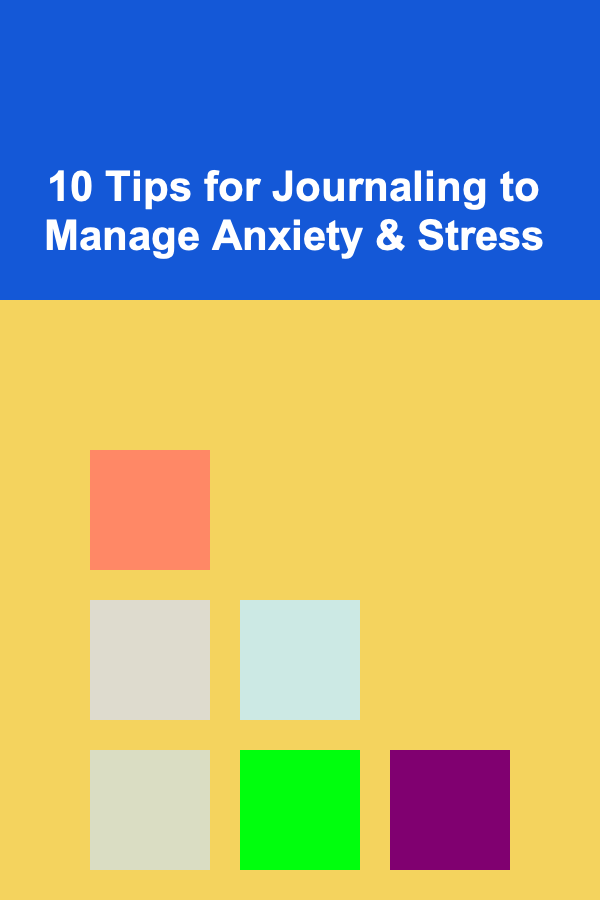
10 Tips for Journaling to Manage Anxiety & Stress
ebook include PDF & Audio bundle (Micro Guide)
$12.99$6.99
Limited Time Offer! Order within the next:

In today's fast-paced world, many people struggle with stress and anxiety, which can affect both mental and physical health. The pressures of work, relationships, finances, and the constant flow of information can often lead to a sense of overwhelming emotion. While there are many techniques available to manage stress and anxiety, one powerful and accessible tool is journaling.
Journaling provides a safe space for self-reflection, allowing individuals to express their emotions, understand their thought patterns, and find clarity in difficult situations. The act of writing can help people process their thoughts, release pent-up emotions, and gain a sense of control over their mental state. Whether you're dealing with everyday stress or experiencing more significant anxiety, journaling can be a transformative practice to manage and alleviate these feelings.
In this article, we will explore 10 tips for journaling that can help you effectively manage anxiety and stress. These tips will guide you on how to use journaling as a tool for emotional regulation, self-awareness, and mental well-being.
Start with Freewriting
Freewriting is an excellent way to begin your journaling practice. It involves writing down whatever comes to mind without worrying about grammar, structure, or coherence. The goal is to let your thoughts flow freely, without judgment or expectation.
When you're feeling anxious or stressed, your mind can become cluttered with racing thoughts. Freewriting helps you clear this mental fog by allowing you to release whatever is on your mind. Set a timer for 5 to 10 minutes and write continuously, without censoring yourself. This can help you access underlying emotions, fears, or concerns that you may not even be aware of.
Why It Helps:
Freewriting gives your brain a chance to let go of overwhelming thoughts and organize them into words. This release can provide an immediate sense of relief and clarity.
Create a Gratitude Journal
Gratitude journaling is a practice that involves writing down things you are thankful for. When you are stressed or anxious, it's easy to focus on the negative aspects of your life. However, shifting your focus to the positive can help reframe your perspective and reduce feelings of anxiety.
Each day, write down three things that you are grateful for. They can be as simple as a beautiful sunset, a kind gesture from a friend, or a good meal. Over time, you will begin to notice a shift in your mindset, as you train your brain to recognize the positives, even in challenging situations.
Why It Helps:
Focusing on gratitude shifts your attention away from stress and anxiety, helping you appreciate the present moment. It fosters a sense of contentment and reduces negative thinking patterns.
Write About Your Triggers
One of the most effective ways to manage anxiety is to identify the triggers that cause it. Journaling about specific situations, events, or thoughts that make you feel anxious can help you understand the root causes of your stress. By acknowledging these triggers in writing, you create an opportunity to process them.
Take note of the times when you feel anxious or stressed. What was happening around you? Who were you with? What were you thinking? Writing down these details can help you recognize patterns and anticipate situations that may trigger anxiety in the future. Over time, this awareness allows you to build strategies to cope with these triggers in a healthier way.
Why It Helps:
Understanding your triggers helps you gain control over your anxiety. Instead of feeling overwhelmed by it, you can start to manage and prevent it by being aware of the situations that cause it.
Practice Mindful Journaling
Mindful journaling is the practice of writing with complete awareness of the present moment. It combines the benefits of mindfulness with journaling by encouraging you to focus on your thoughts and feelings without judgment.
To practice mindful journaling, find a quiet space where you can focus on your writing. Before you start, take a few deep breaths to center yourself. Then, write about what you're feeling in the moment---without trying to analyze or judge your emotions. If your thoughts wander, gently bring them back to the present.
Why It Helps:
Mindful journaling helps you stay grounded in the present moment, which can be especially helpful for managing anxiety. It encourages self-compassion and acceptance, allowing you to experience your emotions without becoming overwhelmed by them.
Use Prompts to Explore Your Feelings
Sometimes, it can be difficult to know what to write about when you're feeling anxious or stressed. In these cases, using journaling prompts can help guide your thoughts and provide structure to your writing. Prompts can encourage you to explore your emotions, fears, and aspirations, giving you a deeper understanding of yourself.
Here are a few prompts you can use:
- "What am I feeling right now?"
- "What is the source of my stress or anxiety?"
- "What do I need to let go of?"
- "How can I take care of myself today?"
You can also create your own prompts that are tailored to your specific needs. The key is to focus on questions that help you explore your emotions and develop strategies to cope with them.
Why It Helps:
Prompts can make it easier to start journaling, especially when you're feeling overwhelmed. They give you a focused direction, helping you to express your feelings more clearly and effectively.
Write a Letter to Your Anxiety
One powerful way to deal with anxiety is to personify it. By writing a letter to your anxiety, you can externalize the emotions you're feeling and gain a sense of control over them. In your letter, speak directly to your anxiety as if it were a person.
You might write something like: "Dear Anxiety, I know you're trying to protect me, but your constant presence is exhausting. I need a break from you. I'm going to take some deep breaths and remind myself that I am safe."
Writing a letter to your anxiety can help you distance yourself from it, allowing you to recognize that anxiety is just a feeling, not an identity. This process can be empowering and therapeutic.
Why It Helps:
This exercise allows you to externalize your anxiety, making it feel less overwhelming. By speaking directly to your anxiety, you gain a sense of control and clarity over your emotions.
Write About Your Achievements
When you're dealing with anxiety and stress, it can be easy to forget your accomplishments. Journaling about your achievements---big or small---can boost your self-esteem and remind you of your strengths. Whether it's finishing a project at work, getting through a difficult day, or making time for self-care, take a moment to celebrate your wins.
Each time you write about your achievements, you reinforce a sense of accomplishment and confidence. This practice can help you build resilience in the face of stress and anxiety.
Why It Helps:
Focusing on your achievements reminds you of your capabilities and strengths. It fosters a sense of pride and helps counteract feelings of inadequacy that often accompany anxiety and stress.
Use Journaling to Set Boundaries
Setting healthy boundaries is essential for managing stress and maintaining mental health. Journaling can be a great tool for identifying where you need to set boundaries in your life. Whether it's at work, in relationships, or within your own personal space, writing about your needs can help you clarify what is acceptable and what is not.
Reflect on situations where you've felt overwhelmed or taken advantage of. What could you have done differently? How can you set boundaries to protect your mental and emotional well-being moving forward?
Why It Helps:
Journaling about boundaries allows you to gain clarity on your needs and values. It empowers you to communicate your limits more effectively and protects you from unnecessary stress.
Reflect on Past Coping Strategies
If you've experienced anxiety in the past, take some time to reflect on the coping strategies you used during those times. What worked for you? What didn't? Journaling about these experiences can help you identify effective coping mechanisms and create a toolkit for managing future anxiety.
You might also consider journaling about any new strategies you'd like to try. Whether it's breathing exercises, exercise, or mindfulness, writing about your plans can help you commit to them and make them part of your regular routine.
Why It Helps:
Reflecting on past coping strategies allows you to learn from your experiences. It also helps you build a personalized set of tools for managing stress and anxiety in the future.
Be Kind to Yourself
Finally, it's essential to approach journaling with self-compassion. When you're feeling anxious or stressed, it's easy to be critical of yourself, but journaling is an opportunity to be kind and understanding. Treat yourself with the same compassion you would offer to a friend.
If you make mistakes or feel like you're not doing enough, acknowledge these feelings without judgment. Remember, journaling is not about perfection; it's about self-expression and growth.
Why It Helps:
Self-compassion helps reduce feelings of guilt or shame that often accompany anxiety. By being kind to yourself, you cultivate a sense of peace and acceptance, which can alleviate stress and promote healing.
Conclusion
Journaling is a powerful tool for managing anxiety and stress. By incorporating these 10 tips into your journaling practice, you can create a safe space for self-expression, gain clarity, and build resilience in the face of challenging emotions. Whether you're using freewriting to release pent-up thoughts, setting boundaries to protect your well-being, or reflecting on your achievements, journaling can be a transformative practice for mental health. So, grab a pen and start writing---your journey to emotional well-being begins on the page.
Reading More From Our Other Websites
- [Horseback Riding Tip 101] Best Approaches to Overcoming a Horse's Fear of Water Crossings
- [Ziplining Tip 101] Soaring Into Change: How Ziplining Can Kickstart a Fresh Start
- [Survival Kit 101] Budget Survival Kit: How to Build an Affordable Emergency Preparedness Kit
- [Home Party Planning 101] How to Create a Relaxed Outdoor Home Party Setup
- [Metal Stamping Tip 101] How Advanced Metal Stamping Techniques Reduce Costs and Boost Quality in Hardware
- [Home Pet Care 101] How to Use Pet Dental Treats as a Training Aid While Improving Your Pet's Oral Hygiene
- [Organization Tip 101] How to Create an Online Presence for Your Charity Efforts
- [Paragliding Tip 101] Best Paragliding Destinations for Uncrowded Thermal Soaring in Summer
- [Home Renovating 101] How to Master the Art of House Flipping: Essential Tips for Beginners to Maximize Profit
- [Organization Tip 101] How to Use Storytelling to Enhance Your Event's Theme

Energy-Saving Tips You Need to Know for a More Eco-Friendly Lifestyle
Read More
How to Create a Composting System for Garden Waste
Read More
How to Create a Personalized Cleaning Supplies Caddy
Read More
How to Protect Your Dropshipping Business with Proper Terms and Conditions
Read More
How to Find the Best Local Food on a Budget
Read More
How to Build a Custom Golf Equipment Bag
Read MoreOther Products

Energy-Saving Tips You Need to Know for a More Eco-Friendly Lifestyle
Read More
How to Create a Composting System for Garden Waste
Read More
How to Create a Personalized Cleaning Supplies Caddy
Read More
How to Protect Your Dropshipping Business with Proper Terms and Conditions
Read More
How to Find the Best Local Food on a Budget
Read More